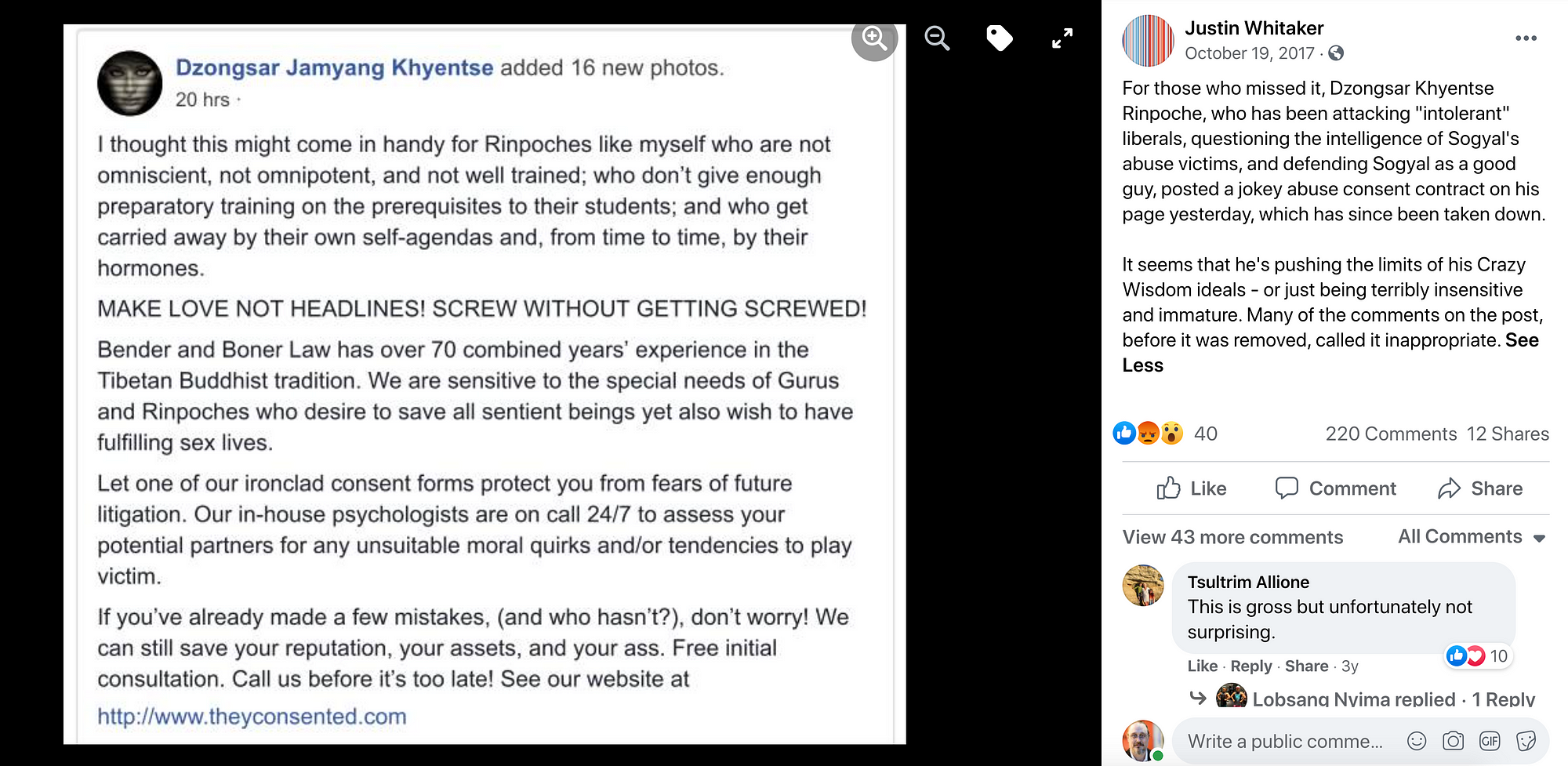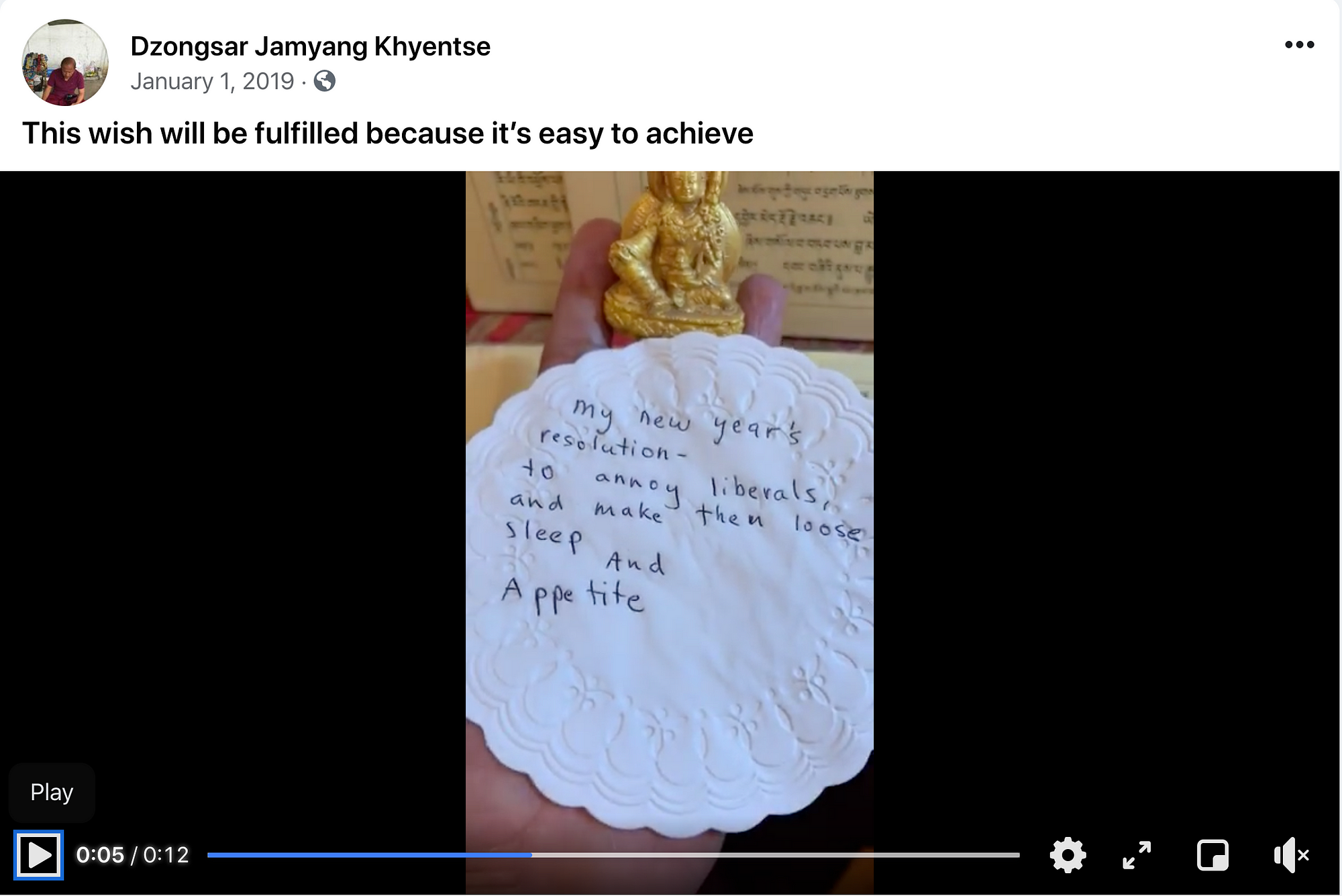To understand how a worldly and sophisticated 60 year-old Bhutan-born Buddhist lama starts shitposting about #metoo, we need some background and nuance. Dzongsar Khyentse Rinpoche isn’t your typical 4chan troll. He’s on a mission to defend a global spiritual industry that’s crumbling under the weight of its abuse revelations. Somehow, he believes that cloaking the presumption of ancient spiritual superiority in victim-blaming jokes and memes is a good strategy.
So here we go:
In July of 2017, eight close students of Sogyal Lakar, famous for his ghostwritten bestseller The Tibetan Book of Living and Dying, published an open letter.
They accused their seemingly impish guru of defrauding the devout followers of his neo-Buddhist church, Rigpa International, to support a “sybaritic” lifestyle of hypocrisy and sadism. They accused him physically and sexually assaulting them and others, and screaming abuse whenever his constant stream of luxuries slowed down —expensive takeout, masseuses at all hours, television binges, extravagant cigars.

The open letter echoed public accusations dating back over decades. In 1994, an anonymous plaintiff sued Lakar for $10,000,000 for assault and battery, and emotional distress. Reporting on the suit revealed that a Rigpa official in the U.K. had resigned in 1992 over Lakar’s sexual abuses, and written to the Dalai Lama to ask for an intervention. A 2011 documentary detailed sexual assault and rape accusations against Lakar dating back to 1976, and in 2014 a French anthropologist published the results of a seven-year study of Rigpa, concluding that the entire organization was dedicated to Lakar’s well-being.
Six months after the open letter dropped, Rigpa International launched an independent investigation through a U.K. law firm. The resulting report, published in August of 2018, validated every accusation, and recommended that Lakar be banned from Rigpa and isolated from his former devotees. Just over a year later, Lakar died of colorectal cancer in Thailand. He was 72.
The Lakar-Rigpa story was the first domino in a line of global neo-Buddhist organizations forcefully interrogated by the #metoo movement. In February of 2018, a survivor-whistleblower published the first of three investigations into historical abuses in Shambhala International. In March of 2018, Gen-X neo-Buddhist leader Noah Levine was accused of sexual misconduct. The following spring, a group of senior nuns published an open letter condemning the alleged sexual abuses of leading teacher Dagri Rinpoche. That summer, The Guardian updated its 1997 investigation into the rape history of Dennis Lingwood, known as Sangharakshita, who founded Triratna in the U.K. in 1967. Lingwood died in 2018. And in May of this year, Ogyen Trinley Dorje — the 17th Gyalwang Karmapa—was sued for spousal support by a Canadian woman who alleges he raped her and has abandoned her with his child.
The rapid-fire revelations have prompted deep soul-searching within the global Buddhist world. Shambhala International, teetering on the brink of financial ruin, has pivoted some programming to incorporate social justice themes. The Dalai Lama encouraged whistleblowers and blamed the culture of abuse in part on vestigial elements of Tibetan feudalism. And two Religious Studies scholars based in Florida, Ann Gleig and Amy Langenberg, received a grant worth $550,000 to study clerical abuse in American Buddhism over five years.
But as Buddhist social media feeds overflowed with disillusioned meditators yearning for a safe haven, Dzongsar Jamyang Khyentse (also known as Khyentse Norbu) showed up to troll them in full fuck-your-feelings style.
Norbu, known for liberal-baiting, told Lakar’s distressed students they should have known better and that speaking ill of him, or any high Tibetan lama, would lead to rebirth in hell. To salt the wound, Norbu sent a long public letter of support to the Rigpa community and board, urging them to stay the course with their devotions. Then he published a spoof legal waiver for prospective lamas to have their students sign before submitting to sexual abuse.
Norbu felt the shock waves of the Buddhist #metoo era, and decided to surf them.
Norbu comes from a decorated family of Tibetan Buddhist teachers, and is said to be a “Rinpoche” — a reincarnated “precious one” who is born to carry perfect and rare teachings forward from a primordial source. He’s known for engaging his cosmopolitan global audience with pugnacious erudition, pot-stirring books, and a flair for documentary filmmaking, in which he was reportedly tutored by Bernardo Bertolucci, who he met on the set of “Little Buddha”.
Norbu shared the global stage with abuser Sogyal Lakar as a popular teacher of Tibetan Tantric Buddhism, also known as “Vajrayana”. When his students asked him in the summer of 2017 to comment on the accusations against Lakar, he obliged them by posting a ten thousand-word essay that was shared over a thousand times on Facebook, and lauded by his students around the world as a nuanced defence of Vajrayana’s abiding magic and the unorthodox but saving bonds it promotes between teachers and students.
But Norbu’s sadistic novella spent none of its words on the accusations against Lakar. Rather, it sermonized on the glory of the Vajrayana process, and lamented the poor education of those who claim to be hurt by it. The letter writers, Norbu argues, must have known what they were in for as Vajrayana students. They should have had “superior faculties” that would have allowed them to transform the perception of Lakar’s abuse into a belief in his spiritual care. These faculties should have been further cemented by the students’ “samaya”, or psychospiritual commitment to Lakar.
The essay reminded readers that for Lakar’s students to break samaya by not framing all of his actions as beneficial condemns them to aeons of literal hell. As for non-Tibetan consumers of Lakar’s content: they are hopelessly naïve, Norbu argued. Attempts to investigate whether concepts like “samaya” contribute to grooming conditions for abuse is the folly of “a few liberal, puritanical, Abrahamic, or individualistic activists”, he wrote.
Norbu also piled on, Jordan Peterson-style, culture war rhetoric that conflated whistleblowers with snowflakes:
If you are uncomfortable with the non-dual groundlessness of Buddhism — you might just as well follow one of the Abrahamic religions. These are the religions that follow a clearly grounded dualistic path and say things like “don’t eat pork, do eat fish, and women must wear burqas.” If the label ‘religion’ is altogether too embarrassing for your elitist so-called progressive minds, you might try some kind of quasi-atheistic secularism, coated with moralistic ethics and bloated with dogmatic liberal self-righteousness. Or you could blindly allow yourself to be swallowed up by existentialist angst, then get annoyed with those who get blissed out on hope.
Judging by the comments, many supporters appreciated the tough love.
In October of 2017, Norbu escalated the anti-political-correctness rhetoric to outright mockery, dressed up in satire. In a post he has since tried to delete, he presented a sixteen-page spoof contract produced by “Bender and Boner Lawyers” designed to ensure regular-guy Rinpoches like himself “who desire to save all sentient beings yet also wish to have fulfilling sex lives”. In Norbu’s shitposting world, the contract would ensure that Rinpoches have the legal consent of students they want to have sex with.

In the style of Tibetan philosopher-rebels who historically have delighted in mocking all moral and existential positions as absurd, Norbu is plausibly making fun of multiple sentiments at the same time. He’s spoofing both predatorial American litigiousness and the damage-control industry. He’s self-deprecating in his suggestion that because he lacks omniscience and is remains a red-blooded male, he needs a contract like this for self-protection. He’s questioning the sanity of potential students, and the perceived prudery of spiritual aspirants by listing, exhaustively, the-explicit sex acts that the hypothetical Rinpoche needs his students to consent to.
The primary target of the contract, however, is the “snowflake” attitude, deemed so uptight, legalistic, and politically correct that all of the spontaneity of both sexual ecstasy — and, by implication, spiritual realization — would be outlawed. Consent, the contract suggests, is a buzz-kill.
Norbu kept busy during the Trump years. In January of 2018 he meme-implied that he was a victim of the #metoo movement, but from the incel perspective of being tortured by women’s bodies:
In November, Norbu published an open letter in support of Aung San Suu Kyi, defending her amidst global criticism of Myanmar’s persecution of the Rohingya Muslim minority. A pro-democracy, Burmese Buddhist activist named Maung Zarni clapped back.
A few weeks later, Norbu came out in seemingly ironic support of Trump:
And then he rang in 2019 with some ritual trolling:

Now, Norbu has a new book out: Poison is Medicine: Clarifying the Vajrajana. It consists of edited transcripts of lectures he gave at Rigpa centres in Europe in 2018, while the Lakar abuse case boiled over. At the end of the introduction, he thanks a female aide for putting together “all my frantic, disjointed text and voice messages to make this book.”
The book is an extended apologia for his religion. “The Vajrayana is the best thing that ever happened on this planet,” Norbu declares, and goes on to laud the accomplishments of abusive teachers like Chögyam Trungpa and Sogyal Lakar.
However, Norbu also adopts a more sober tone in places.
“I deplore sexual abuse in any shape or form and am, of course, deeply concerned about the victims,” he writes.
Time will tell if he is still trolling.
No comments:
Post a Comment